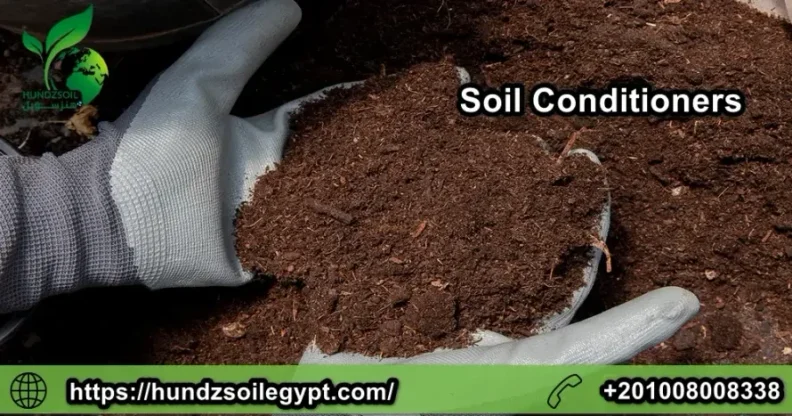Types of Soil Conditioners: A Comprehensive Guide to Enhancing Soil Quality and Increasing Productivity

Soil conditioners are vital solutions that significantly improve soil quality and increase agricultural yields. In the face of challenges like desertification and reduced soil fertility, the use of soil conditioners has become indispensable for achieving agricultural sustainability and ensuring food security.
In this article, we delve into the different types of soil conditioners, their benefits, and how to use them effectively, with a special focus on the importance of organic conditioners such as the leading product Henzsoil.
What are Soil Conditioners?
Soil conditioners are natural or synthetic materials added to soil to enhance its physical, chemical, and biological properties. Their primary aim is to improve water retention, provide nutrients to plants, and address soil issues such as alkalinity or salinity.
Benefits of Using Soil Conditioners
- Increase Soil Fertility: They supply essential nutrients like nitrogen, phosphorus, and potassium.
- Improve Soil Structure: Conditioners enhance aeration, drainage, and reduce excessive compaction in clay soils.
- Boost Biological Activity: They activate microorganisms that help decompose organic matter and release nutrients.
- Reduce Salinity and Alkalinity: Some conditioners adjust soil pH and improve the quality of saline or alkaline soils.
- Enhance Water Efficiency: Conditioners improve soil’s water-holding capacity, reducing water wastage.
Types of Soil Conditioners
Soil conditioners are categorized into several types, chosen based on soil conditions and crop requirements:
1. Organic Soil Conditioners
Organic conditioners are the top choice for farmers due to their sustainable benefits and eco-friendly nature.
Examples:
- Compost: Made from plant waste and food scraps, rich in nutrients.
- Manure: Derived from animal waste, high in organic matter and nutrients.
- Henzsoil Organic Conditioner: Contains 70% organic materials, ideal for reclaiming desert lands and improving infertile soils.
Benefits:
- Enhances physical and chemical properties of the soil.
- Promotes root growth and increases crop productivity.
- Reduces reliance on chemical fertilizers.
2. Chemical Soil Conditioners
Chemical conditioners are used to quickly modify soil properties.
Examples:
- Agricultural Lime: Adjusts soil acidity and balances nutrients.
- Agricultural Sulfur: Improves alkaline soils and reduces salinity.
- Phosphogypsum: Enhances permeability in clay soils and reduces compaction.
Usage Notes:
- Apply cautiously to avoid harmful element build-up.
- Conduct soil analysis before use for optimal effectiveness.
3. Natural Soil Conditioners
These are derived from natural sources and used to improve soil properties.
Examples:
- Zeolite: Improves water and nutrient retention.
- Expanded Clay: Enhances aeration and water drainage.
- Dolomite: Enriches soil with magnesium and calcium.
4. Biological Soil Conditioners (Biofertilizers)
Biological conditioners rely on microorganisms to enhance soil quality.
Examples:
- Beneficial Bacteria: Fix nitrogen from the air into the soil.
- Mycorrhizal Fungi: Boost nutrient absorption by plant roots.
- Algae: Improve soil fertility and plant growth.
Advantages:
- Maintain soil ecological balance.
- Reduce dependence on traditional fertilizers.
5. Synthetic Soil Conditioners
These include specially manufactured materials like water-absorbing polymers.
Benefits:
- Increase water retention in soil.
- Improve plant drought resistance.
How to Choose the Right Soil Conditioner?
When selecting the best soil conditioner, consider the following:
- Soil Type: Clay, sandy, or alkaline soils have different needs.
- Crop Type: Some crops require nutrient-rich soil, while others do not.
- Climate Conditions: Temperature and humidity affect conditioner efficiency.
Henzsoil Organic Conditioner: The Ideal Solution
Henzsoil is one of the best organic soil conditioners available, with a composition of 70% organic material. Its outstanding features include:
- Improving sandy soil structure and reclaiming desert lands.
- Reducing irrigation water usage by 50%.
- Providing essential nutrients for plants over extended periods.
- Enhancing soil water retention and minimizing losses.
Why Choose Henzsoil?
- Eco-friendly and free from harmful chemicals.
- Increases crop productivity in infertile soils.
- Economical and sustainable for farmers.
- Requires only four applications for a lifetime impact on soil.
Tips for Effective Use of Soil Conditioners
- Conduct a thorough soil analysis to identify its needs.
- Start with small quantities and observe plant response.
- Follow manufacturers’ guidelines for optimal results.
Conclusion
Soil conditioners play a vital role in enhancing soil quality and boosting sustainable agriculture in Egypt. Choosing the right type based on soil and crop needs is crucial. Henzsoil sets an excellent example of an organic soil conditioner delivering effective and sustainable results, making it a perfect choice for farmers seeking successful and sustainable farming.
FAQs
What is a soil conditioner?
A soil conditioner is a natural or synthetic material added to soil to enhance its physical, chemical, and biological properties, aimed at increasing soil fertility and promoting plant growth.
What is the difference between soil conditioners and fertilizers?
- Soil Conditioners: Focus on long-term improvement of soil structure and properties.
- Fertilizers: Provide essential nutrients directly to plants during the growing season.
Can organic soil conditioners be used in sandy soils?
Yes, organic conditioners like Henzsoil are highly effective in improving sandy soils by increasing their water and nutrient retention capabilities.
How to choose the right soil conditioner?
Conduct soil analysis to identify issues such as nutrient deficiencies, drainage problems, or acidity. Then select an organic, chemical, or biological conditioner accordingly.
Are soil conditioners environmentally safe?
Yes, organic and biological conditioners like Henzsoil are completely safe and eco-friendly. However, chemical conditioners should be used carefully in limited amounts.
How long does it take for soil conditioners to show results?
- Organic Conditioners: May take several months for gradual soil improvement.
- Chemical Conditioners: Provide quicker results but may be temporary if not balanced properly.
Can soil conditioners be used in desert soils?
Yes, organic conditioners like Henzsoil are specifically designed to enhance fertility and support sustainable agriculture in desert soils.
Is it safe to mix different types of soil conditioners?
Some soil conditioners can be mixed if compatible and without adverse reactions. For example, combining organic and biological conditioners can enhance their effectiveness, but consult an agricultural expert to avoid mistakes.
